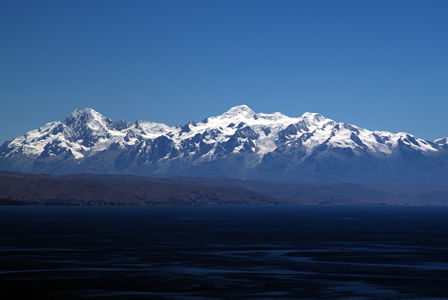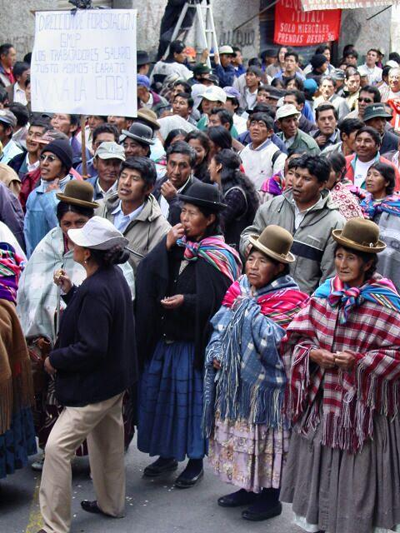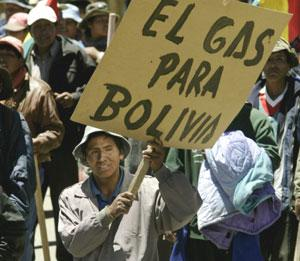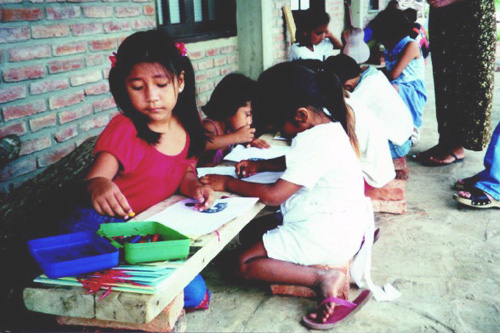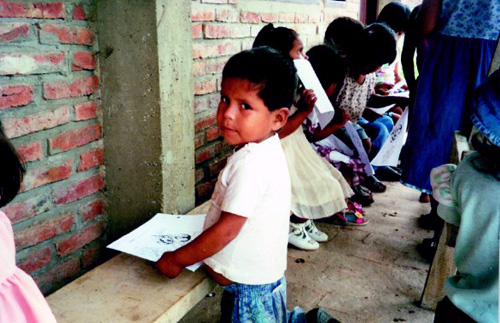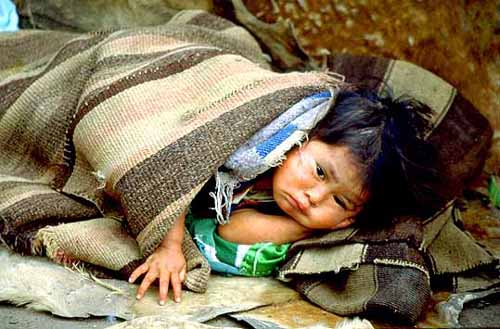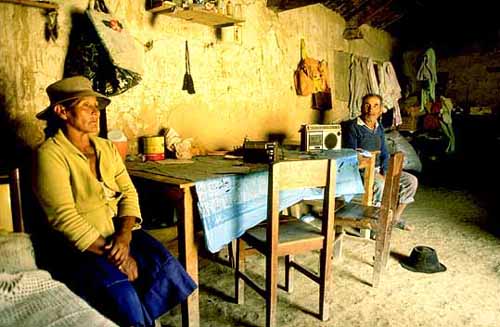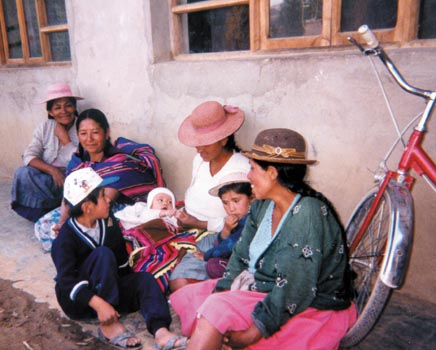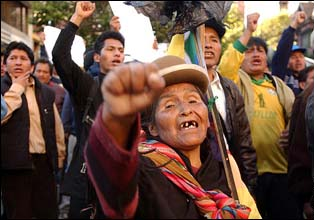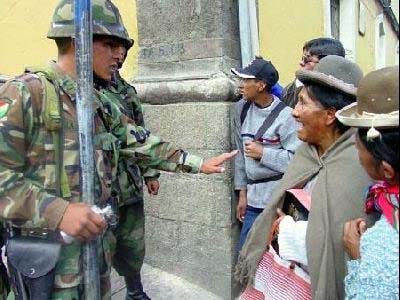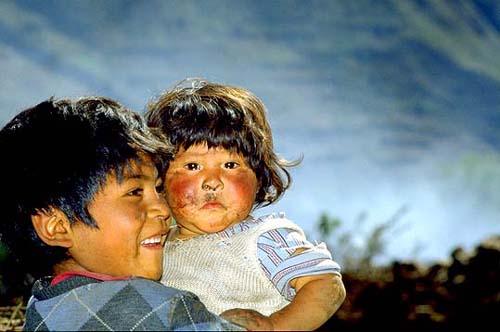|
REALITY IN THE WORLD BOLIVIA |
||
|
ENGLISH |
||
|
|
|
|
| . | ||
|
|
||
| . | ||
|
Reality in Bolivia |
||
| . | ||
|
|
||
|
The
actual crisis in Bolivia is social, economic and politics. On the social
plan, despite the increase of the services, the poverty and the
vulnerability they are in growth. The exposure of the families to the
shocks and the continuous change, above all among the poor men of the
countries is ramatically worsened. On the economic plan, growth has been
miserable and accompanied by the increase of the unemployment and the
underemployment structural. More than the 70% of the new places of
employment created in the last 15 years has been in the sector"
informal." On the political plan, Bolivia is seen a dramatic crisis:
the governments and her" political class" as it calls here her
it witnesses a crisis of legitimacy unprecedented. |
||
|
|
||
|
These
three different sectors of crisis are clearly connected to the politics
imposed by the international financial institutions, particularly way
from the International Fund Monetary. Analysis clearly shows that the
politics prescribed by the IMF, among the other, they have not produced
a strong or sustainable growth; they have opened the road to new social
vulnerabilities to the countries, to the communities and the families;
they have accented the inequalities, that brake the growth, they conduct
the political systems to the point of breakup and they produce new and
powerful forms of crime and social tension. |
||
|
|
||
| Bolivia
has been a pupil model for these" reforms" and, it is also now
an exemplary case of the contradictions and the crisis that these
politics produce. Later almost two decades of" reform" and of
structural adjustment Bolivia is grown" even though is grown"
slowly; the Bolivians are socially more and more vulnerabilities and
more and more poor, while the society in its complex is iniquitous more
and more and unequivocally unfair. Reference should be made to the
political aspect. |
||
|
|
||
| The
political prescriptions of the IMF have systematically escaped the
fundamental decisions of economic politics to the political trial. This"
emptying" some real politics has weighed a lot on the crisis of
legitimacy of the" political class." The IMF has accepted the
appeal of the organizations of the civil society to include, in the
dialogues for the elaboration of strategies for the reduction of the
poverty," the problems macro economic", but without naivety it
proposes that of such problems are made load the national governments:
that same governments whose hands are tied up from the conditions of the
IMF. |
||
|
|
||
| The
actual crisis in Bolivia brings the imprint of the politics of the IMF,
both in terms of structural conditions and immediate of causes. The
anaemic growth, two, both to inside factors and to external factors to
Bolivia, you/he/she has had resulted as to dramatic fiscal crisis: the
deficit is now esteemed superior to the 8%. The prescriptions of the IMF
have dark been austerity and of further hold of strap: on the slope of
the expense the IMF recalls to one" flexible situation" of the
government expenditure, that means to adjust the salaries of the public
sector to the national economic output and to allow the devaluation to
erodes the value of the contributions of the pensions. The character
against the poor men of these measures should be clear. |
||
|
|
||
| On the
slope of the entrance (wants to say) a heavy taxation more and more,
that essentially means to make to pay more taxes to the people,
primarily to the poor men and the middle class and the strength
beginning of the exports of the natural gas. Bolivia has enormous
reserves of natural gas. Nevertheless as must be exploits the gas and to
whom the profits will go, in Bolivia they are thematic animated politics.
There is a good motive for an animate debate: You Bolivia has passed
through the 3 bigger cycles of export of non renewable commodities: the
silver in the XIX century, the guano and the rubber toward the end of
the 800, the pond in the XX century. |
||
|
|
||
| These
cycles of exports have never set the bases for the construction of a
prosperous, productive and correct society. Contrarily, Bolivia is one
of the prosperous and more unfair societies of Latin America. The
question, that justly the Bolivians are set, is it": In that way
the next cycle of exports of non renewable good will be translated in a
real development?" |
||
|
|
||
|
Two
things macaws clear for the Bolivians: the political ones, submitted to
the management and the dictats of the IMF, you/they have given test to
absolutely be deceitful in the management of the economic affairs of the
country. In this context, the IMF has coherently supported and promoted
the precipitous run of the political class to the export of the gas on
basic the of conditions and accords, that macaws destined to translate
this further cycle of exports in another sad chapter of squandering of
wealth and under development. This Khan be seen him/it in the last
Accord for the Support, signed with fifty-fifty Bolivia 2003 and in the
followings revisions of the same to August and in September of 2003. |
||
|
|
||
| The"
problem of the gas" it is the political matter related to the most
important development in Bolivia today. Some sectors sustain that first
of all in Bolivia productive activity should be created and not for the
exports; others ask for to slow down for allowing that the exports bring
profits to the country, contributing to the growth of the productive
ability of the productivity and to the reduction of the poverty. In
every case, there is an application of transparency and discussion in a
trial that will have enormous consequences for the future of Bolivia. |
||
|
|
||
| But the
position of the IMF goes to opposite direction, sustaining the rapids
conclusion of dark accords stipulated among multinationals not
transparent and political gluttons, that people cannot know on thing
concerns, and still less you/he/she can appraise and to make to feel his.
It is clear that the position of the IMF on this problem and the
traditional antidemocratic practices of the last decades they have only
underlined the lack of transparency and the structural absence of
democracy, adding to them turns gasoline to the fire that today consumes
Bolivia. |
||
| . | ||
| The
realization of this article has been possible graces to the
collaboration of some friends of mine journalists and photographers
Argentinians and Bolivian, that have given me the possibility to make a
reconstruction of some social phenomenons that an indelible sign is
leaving in the history of the humanity through their precious
documentation - Piero C. |
||
| . | ||



